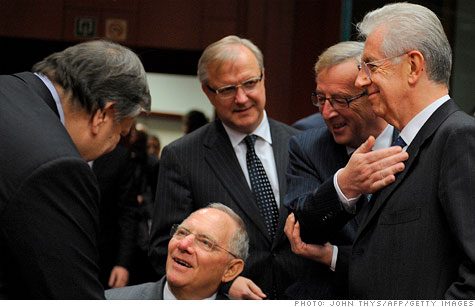
Finance ministers from Greece, Germany and the newly appointed Prime Minister of Italy met with top European Union officials to discuss the eurozone debt crisis.
NEW YORK (CNNMoney) -- In the increasingly desperate search for the proverbial big "bazooka," European policy makers are now exploring ways for the International Monetary Fund to help contain the eurozone debt crisis.
The latest talk of the IMF acting as an intermediary for the European Central Bank comes as rescue efforts announced last month fall short of expectations.
Late Tuesday, the Eurogroup of eurozone finance ministers announced the details of a plan to strengthen what they call a "firewall" against the debt contagion spreading across the eurozone.
But the Eurogroup did not specify how much the two-part plan would boost the firepower of the European Financial Stability Facility, saying the final amount depends on how market conditions develop over time.
In October, European leaders said the fund could be increased to as much as €1 trillion as a result of the leverage scheme, which involves partially insuring government bonds and creating special investment vehicles to attract capital from private sector investors.
Analysts say the amount is closer to €750 billion, since the EFSF has only about €250 billion that is not already earmarked.
Klaus Regling, the stability fund's chief executive, said many investors are interested in the new offerings, but stressed that it will take time for the leverage to work.
"It should be clear that we do not expect investors to offer large amounts of money in the next few days or weeks," said Regling.
While the finance ministers may have come up short, European stocks still rallied Wednesday after six major central banks -- including the Federal Reserve and European Central Bank -- announced a coordinated action to pump more dollars in the global financial system.
The unofficial goal is to ward off a credit crunch in Europe, where commercial banks have been struggling to secure short-term funding in the U.S. currency.
In the meantime, European finance ministers are exploring options to increase the resources of the IMF, which has already taken part in bailouts of Greece, Ireland and Portugal.
European officials are also reportedly considering using the IMF to get around restrictions on the ECB against providing direct support for troubled euro area economies.
Analysts said the plan is to funnel ECB loans into the IMF, which could then be used to either buy government bonds in the secondary market or bolster the stability fund.
Daniel Gros, director of the Center for European Policy Studies, said this method would not require a lengthy rewriting of European Union treaties. It would also provide political cover for Germany and other countries that are opposed to more ECB intervention, he added.
"It will help politically," said Gros. "It's not the ECB intervening. It's the IMF."
The problem, analysts say, is that the IMF does not have the resources to make a dent in the debt crisis on its own.
The IMF, which measures its funds in a basket of currencies known as Special Drawing Rights, has about $390 billion to work with.
That compares with an estimated €2 trillion in funding needs for the most troubled euro area economies, including Italy and Spain.
Beyond the lack of sufficient funds, there are serious questions about how much risk the IMF would assume if it began intervening in the sovereign debt market.
"Even if it was the IMF that was taking on the risk, it would have to be backed globally," said Jennifer McKeown, senior European economist at Capital Economics in London.
In discussing a possible third option to leverage the stability fund, Eurogroup head Jean-Claude Juncker said the ministers will "rapidly explore an increase of the resources of the IMF through bilateral loans."
The goal, he added, is for the IMF to "match the firepower of the EFSF and work more closely with it."
Olli Rehn, the European commissioner for economic and monetary affairs, said officials are consulting with the IMF and potential "contributors."
"There is very broad support within the euro area to increase resources," he said. "I can say we see pretty much eye-to-eye with [IMF] Managing Director Lagarde in this regard."
Still, analysts said convincing other members of the 187 country IMF could be difficult. For example, the United States, the largest IMF backer, has said repeatedly that the fund's resources are sufficient.
"It's not clear whether other countries will be keen to put in more resources to the IMF, especially considering that many of them have their own problems," said Enam Ahmed, a senior economist Moody's Analytics in London. ![]()
| Overnight Avg Rate | Latest | Change | Last Week |
|---|---|---|---|
| 30 yr fixed | 3.80% | 3.88% | |
| 15 yr fixed | 3.20% | 3.23% | |
| 5/1 ARM | 3.84% | 3.88% | |
| 30 yr refi | 3.82% | 3.93% | |
| 15 yr refi | 3.20% | 3.23% |
Today's featured rates: